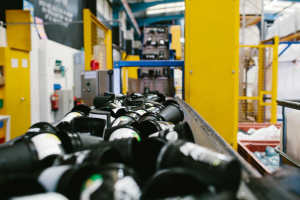When packaging is absolutely necessary, we make it count. When considering packaging, as we consider all end of life challenges for our business, we are focused on eliminating waste, circulating our materials at their highest value and regenerating nature with livelihoods at the heart. To eliminate waste, we invented naked products. To circulate our materials, we source recycled materials for much of our packaging and beyond and have been expanding our global Bring It Back program since 2009. To regenerate nature, we collaborate with our suppliers on the regenerative farming of some of our ingredients. We have been on this journey for over 15 years, leaving the world lusher than we found it by weaving our business practices back into nature’s cycles
Circular Materials
We use plastic responsibly — plastic is lightweight and when used appropriately it can be part of the circular economy. In the UK, we’ve been using recycled plastic since 2008 with our other manufacturing sites following. Our black pots in the UK have been made of between 95% and 97% recycled plastic since we first made the switch in 2008. Our North American black pots have used 95% recycled plastic since 2009. Japan and Australia followed with their black pots in 2010 and then Croatia in 2017. Recently, we have successfully switched the colour additive (known as the master batch) to a recycled source, making our UK black pots 100% recycled. A great achievement that we hope to roll out to our other markets soon. For our clear bottles, we switched to 100% post-consumer recycled PET for the UK market in 2008. The closures have also been tricky however, and were initially made from virgin plastic until we managed to switch to recycled material with a virgin masterbatch, making the lids 97% recycled.
Our black HDPE bottles followed a similar development in 2023 when we made our body spray bottles 10g lighter, saving just under 20 tonnes of plastic per year.
Sprays are even trickier as they are made from mixed materials, but we have had a breakthrough. Most of our pesky pumps, virgin until recently, now have 30-60% recycled content. Our perfume spritzers, Shield, Willow and the 100ml Super Milk pumps are still a work in progress.

Pieces of packaging we are working on are our clear PP pots which for the UK come from a single waste stream, contact lens packaging off cuts, and for North America some from post-industrial waste, as well as our labels which remain virgin after prototyping labels from chemical recycling waste streams and making the decision not to continue sourcing because of questions around traceability and environmental savings. Rest assured, we are working on these and more!
Our clear bottles use 100% recycled Prevented Ocean Plastic™ (excluding lids and labels)

Currently all our markets, except North America, are using Prevented Ocean Plastic™ for our clear bottles (excluding the label and lid). This is a certified recycled PET plastic made from plastic that has been collected within 50km of an ocean coastline or major waterway that would otherwise be at risk of entering and polluting oceans. Every time a customer takes home a product in a clear plastic bottle marked with the POP trademark, they are helping to protect marine ecosystems and the coastal communities who are at the forefront of the effects of ocean plastic pollution.
The plastic used for our clear bottles comes from Indonesia, where a lack of waste management and recycling infrastructure is already being overwhelmed by tourism and a growing population, creating a significant threat of plastic contamination to their wildlife and ecosystems. Plastic bottles are collected from at-risk areas by bottle collectors and delivered to a Prevented Ocean Plastic™ collection centre. These plastic bottles are sorted and pressed for easier transportation, then sent to recycling factories that sanitise them before processing them into raw material pellets. These pellets are then sent to our plastic bottle manufacturer in the UK where they are turned into beautifully clear, high quality recycled plastic bottles!
80% of the plastic polluting our oceans comes from land based sources in developing coastal communities. Once this plastic enters the ocean, it breaks down into smaller particles, becoming extremely difficult to track and remove. Packaging made from Prevented Ocean Plastic™ works to stop harm to marine life and ecosystems before It even enters the ocean.
Bring It Back
We can’t talk about circularity at Lush without talking about our Bring It Back program. For all those products that require packaging, we want to make sure we have a circular solution. Our global Bring It Back schemes bring us a step closer to our goal of changing the collective mindset away from packaging as worthless and disposable, towards it being something of value that is reused as much as possible. While the particulars may vary depending on our different markets, the premise remains the same. Customers are able to return some of our plastic packaging in exchange for either one of our iconic fresh face masks or money back on a Lush purchase. This packaging is then recycled either in house or through a third party to be made into more packaging or into other objects like playgrounds and park benches.
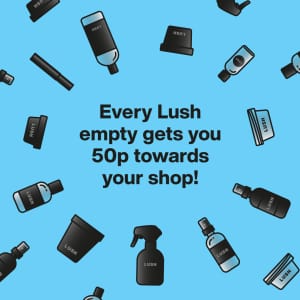
Bring It Back was initially launched in 2009, where customers could return 5 empty Lush black pots and take home a free fresh face mask. Over the years, this resulted in an average of a 14% return rate, which was not good enough for us, so in 2021 we revamped the scheme and started offering our UK customers another option to receive 50p per Lush plastic packaging item off their shop. Not only did we offer our customers more options for their packaging returns, we also increased the packaging types we accepted back. We will now take back any Lush plastic packaging in the UK and recycle it through our Greenhub. This scheme, although not the same everywhere, then spread to all our markets.
In the UK, returned packaging is sent to the greenhub which is then granulated and washed on site. We then send it to our supplier who turns it into recycled pellets, ready to be made into more Lush packaging! In Europe we work with Surfriders who take our returned packaging and turn it all into flakes. Our PP pots are sent to plastic processors near our Croatian manufacturing site which are then turned into pellets. In North America, the returned packaging is processed in Ontario. We store up to 10 tonnes of returns before sending them to be granulated and turned into clean, high quality pellets which are then turned into more Lush packaging. In some markets, we can’t always guarantee that it is our own plastic all the time, because of volumes, but in North America we can.
pieces of packaging returned last year
When it comes to contributing to a circular economy, the last financial year saw customers return nearly 2.7 million pieces of packaging through our Bring it Back scheme, an average return figure of 15%, and a total of 63.5 tonnes of plastic processed.
Through a combination of having our inhouse recycling centre in the UK & the use of 3rd party vendors with better end of life for waste we were able to reach a total diversion rate of 68.4% for our overall global manufacturing waste through recycling, composting or reuse.
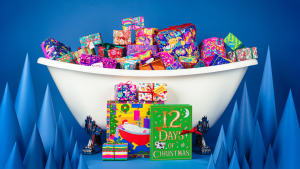
Circular Gifts
Our gifts take recycled materials to a new level — using recycled paper, cotton rags, agriculture waste like banana fibre, knot-wraps from recycled bottles, and ribbons from plastic bottles. Paper, as well as plastic, is an area we know we need to remain mindful of. An average of 400 million tonnes of virgin pulp is used globally every year. This demand is putting pressure on our world’s forests and their communities, and diminishing biodiversity. Our creative buyers are passionate about discovering and using alternative packaging options that can protect and regenerate nature rather than strip precious resources from the planet. Our principle is always to prioritise recycled and upcycled materials from waste such as household and industry waste paper, t-shirt offcuts, etc., as well as what we call ‘future fibres’, which is the term we’ve coined for mindful packaging made from alternative fibres, paper and pulp that are natural, often from agriculture waste, traceable to origin and have a positive impact on communities and the environment.
Between 2023 and 2025, on average 70% of gift packaging items in our range was made from recycled materials.

Alternative Papers
Our banana paper is supplied by Peo and Satoko from One Planet Cafe in Zambia. One Planet Cafe was set up from a desire to solve wildlife destruction and the need to support women’s independence. Banana paper is made from the banana fibre taken from locally grown, organic banana stems which are leftover from the banana harvest. These banana trees are cut back each year after they have been harvested which allows them to regrow. After the fibre has been collected, it is sent to Frogmore Mill in Apsley, UK — the birthplace of paper’s industrial revolution. It’s run by The Apsley Paper Trail, a conservation and education charity dedicated to preserving and presenting the unique industrial heritage of this vital industry and historic site, and a partner who have been essential in helping us develop our banana fibre gift wrap paper. We are currently looking at developing this paper with a mill in Germany as the banana paper has proven too tricky for Frogmore’s prized (and very old) machines!
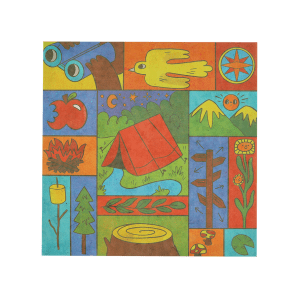
Another alternative paper we use is Lokta paper, handmade in Nepal from the fibrous inner bark of the high elevation evergreen shrub Daphne Bholua, otherwise known as the lokta shrub. In the UK, this winter-flowering shrub is a popular garden plant, but in Nepal it is the basis of a whole industry – the production of lokta paper. At harvest, branches are cut a few centimetres from ground level, allowing the plant to re-grow. We buy our paper from a company that set up and supports a project to create employment and to support empowerment of women in the area bordering India. It is then either hand dip dyed or litho printed in Kathmandu, Nepal.
Circular raw materials
We also work with some interesting upcycled materials. We know that the key to a circular economy is finding value in what would normally be considered waste. We look for ingredient opportunities that maximise the use of precious resources by finding creative ways to use all parts of the ingredient, including the by-products created through the processing of raw materials. We do this in-house, such as with our banana skin ingredients where we use the leftover skins from the fresh bananas that are already used in our products.

We also buy a handful of upcycled ingredients like the Rose Water used in Dream Cream body lotion, which is made in Bulgaria from the steam distillation of rose biomass, a by-product of essential oil production, and the Orange Peel Wax used in Repeat foot balm which is made from the orange peel waste leftover from the juicing industry. We also use Coffee Oil which is a natural, vegan and upcycled ingredient from the Netherlands produced from waste coffee grounds. Compared to conventional oils, upcycled coffee oil uses dramatically less water and land, and its carbon footprint is significantly lower, making it one of the most sustainable oil choices available.

Circular Store Design
Recycled materials don’t just go in our products, they also appear in our shop fit-outs! As you look around a Lush store, you may be looking at recycled yoghurt pots, reclaimed medical equipment or old juice storage (but you would never know it)! Our marble-looking white countertops are supplied to us by Smile Alba, a UK based supplier we have had a long relationship with, who manufacture 100% recycled plastic sheets from waste plastic like yoghurt pots. We also use 100% recycled content acrylic from Greencast who re-introduce their waste into the production process. Any by-product gases are used to produce heat for the factory and they have a take-back scheme to reclaim scrap and manufacture it into new sheets. Even some of our lighting has had special treatment. Our collaboration with Prolight has enabled us to create spot lights made from 50 to 70% recycled aluminium (including the lighting track). The lights themselves use LED for their energy efficiency and Prolight allows us to return lights to them at their end of life for internal recycling or refurbishment.
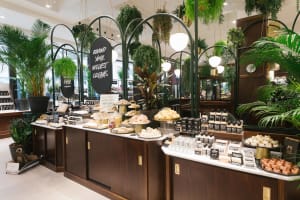
In FY2024, we reused 137 inventory items, meaning instead of getting rid of furniture and set designs from previous projects, we store, refurbish (if needed) and utilise them in future projects. That’s 137 items that we didn’t have to throw away and then repurchase something similar for a different event.
Further reading →
12:11




